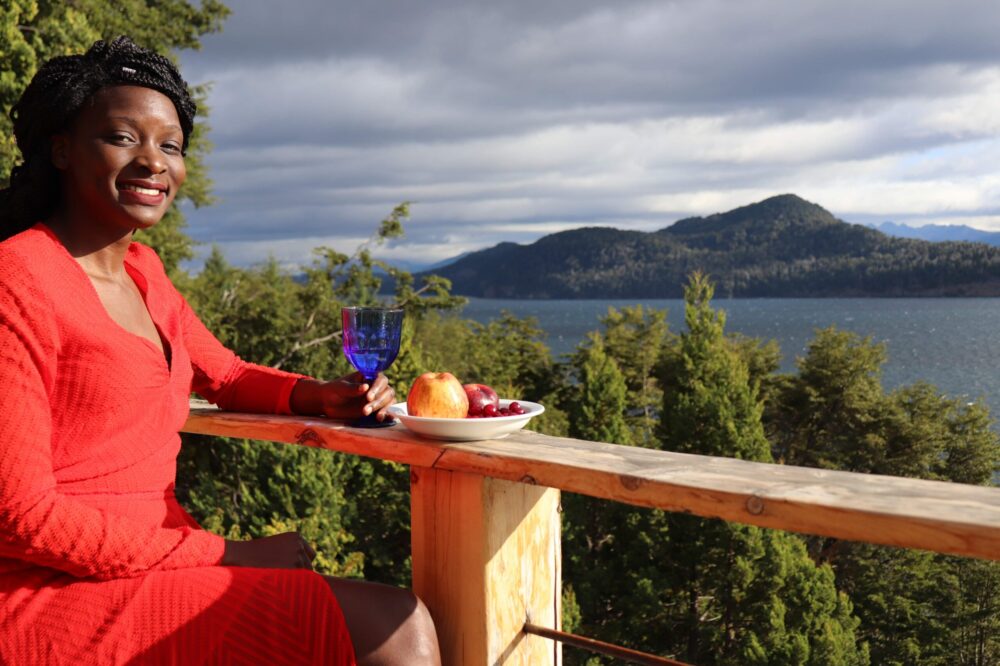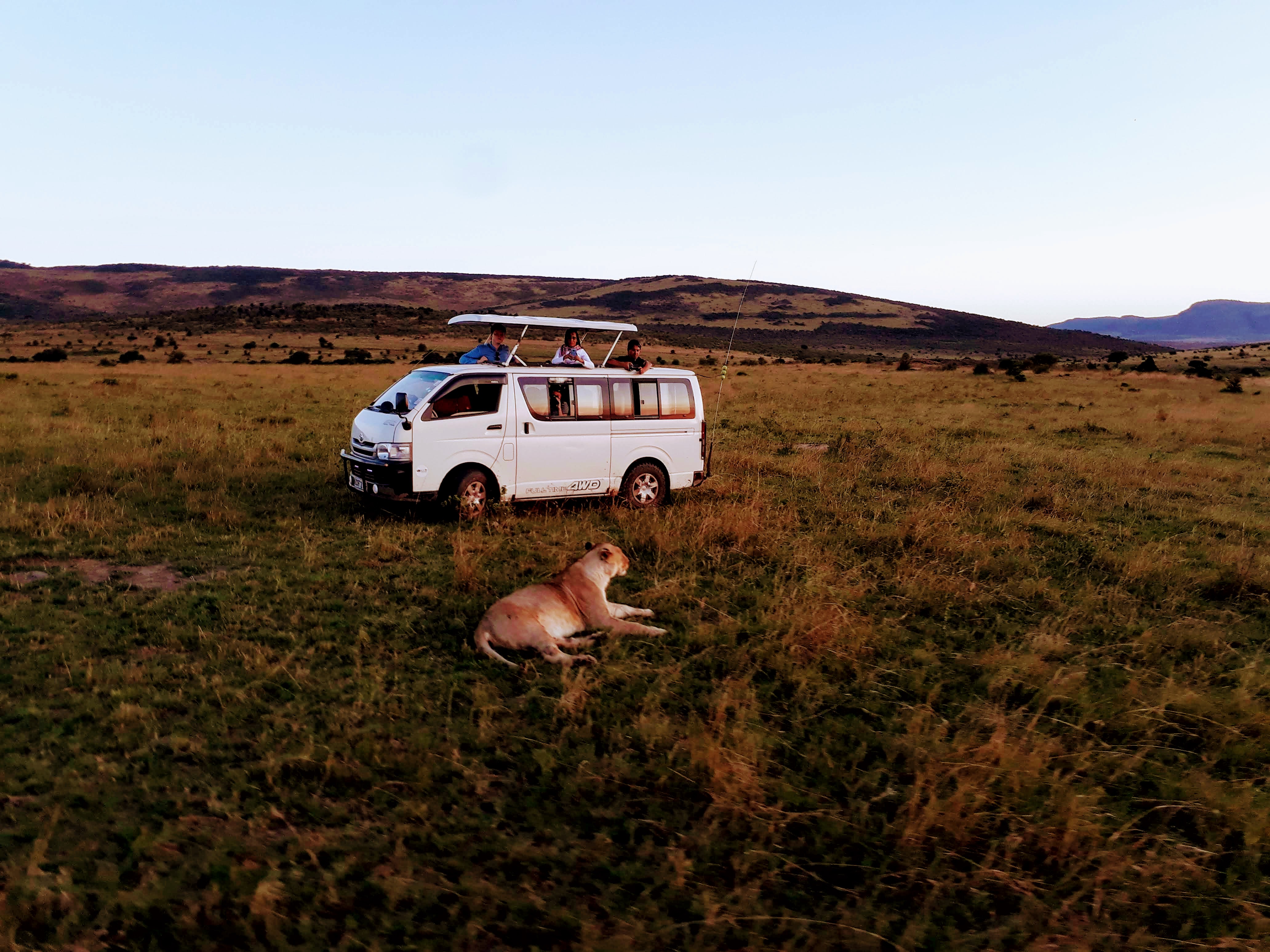
The last time I visited the Maasai Mara was many moons ago. I was a little girl back then.
I remember wondering to myself why dad had brought us to this noisy, overcrowded and unpleasant gathering of man and animal.
The vivid memory of convoys of Kombis and Land Rovers that lined the Mara River in a bid to deliver their packages of curious tourists, as the Wildbeasts struggled to cross over to the other side, has stuck with me to this day.
This past week, my son and I returned to the Mara to check out the possibilities of enjoying this piece of African paradise minus the crowds.

We are welcomed with half a glass each of chemical-ridden pineapple ‘juice’.
Can’t we just stick to drinking water if we can’t have freshly pressed fruit juice!
“Your room is number 8,” a gentleman dressed in traditional Maasai regalia grins at us and offers to take our luggage. “You will find your stuff there when you come back from the game drive.”
Asante sana!
 The communal dining area
The communal dining area
We would stay at Mara Sidai camp. Nothing spectacular to write home about. Great food, excellent customer service, comfy beds, but run-down bathroom facilities that could do with some TLC.
The camp consists of large tents with verandas, covered in iron sheet roofs. The tents have cemented floors covered in canvas. Each bed is bed comes with a mosquito net. Nevertheless, I encourage you to carry some insect repellent for when you’re outside the room.

At night the camp is manned by armed Maasai guards, and lit with light sourced from a standby generator that runs from 6:30 pm to 10:00 pm and then again from 5:30 am to 6:30 am.
There is luke-warm water in the showers that is heated using a wood burner.

We arrive at Oloolaimutia Gate for our first game drive and soon learn that the Mara is not only rewarding in the shoulder season like in the peak months of July and August, but is very affordable to visit, and the short grassland lends itself for better game viewing and animal spotting.
“Mara is very big. About 1,500 square kilometers,” Ben, our guide, gives a brief intro about the reserve to our tour formed group of six united by nothing but enthusiasm for the wild.

Ben’s acquaintance with Mara is matched by the skill with which he outmaneuvers our four-wheel-drive across rivers and streaks it along roughly graded dirt roads boarded by vast rolling plains of grassland, occasionally broken by a lone Balanites aegyptiaca thorn tree, commonly known as the ‘Desert Date.’
Riparian forests, rocky outcrops of dark quartz, and evergreen thickets stain the vast and stark grassland, positioned against the boulder-strewn escarpments and scorched red soil. There is just a simple, unexplainable pleasure and feeling of being at one with nature here.
After several exciting hours, 2 days of game drives, and numerous phone calls between Ben and other guides in the park, we’d been within a stone-throw away from three of the big five…
One of the most challenging animals to see, this elusive feline was my initiation into the proprietorial instinct that seems to kick in on every safari enthusiast.

I succumbed to this crude instinct. I couldn’t get enough of them.

Over time, I discovered that the felines and elephants didn’t care for off-road vehicles and went about their business as if we didn’t even exist.

They would actually pose for us to take pictures.

Others like zebras, antelopes, and gazelles on the other hand were rather wary of our existence and would scamper for safety and be on high alert at the sound of a vehicle.


Watching the king of the jungle take a nap was a surreal experience.

But waiting until he woke up from his sleep was mind-blowing.
It reminded me of the value of patience.

Then he took a moment to say hello…

We saw several of the Mara natives too…


We went on one evening game drive on the day of arrival, and one full game drive the next day.

On the full day game drive, we went by the Mara River for a lunch stop and to get a feel of where the great migration happens.
Walking by the banks of the river, we encountered crocodiles…

And hippos.
“See those hippos over there,”explained our guide, pointing across the river, “they each weigh about 1,500 kg and eats 45 kg of feed every day.”
I was stunned. Who woulda thought!

Hippos spend most of their days in the water cooling off, and only come out briefly to take in some vitamin D.
They spend most nights out in on dry land eating.
Each evening, camp residents gathered in the communal restaurant for dinner and to share their different adventures they had encountered in their various tour groups.
All in all, I thoroughly enjoyed the thrill of searching for animals on the game drives. With time, and after several animal sighting though, it wore out on me. I become kinda blasé and started to have deviant desire for new thrills: like okay, I’ve seen an elephant, a lion, and a cheetah… now can I sport a rhino already?
Nevertheless, I learned to live in the moment and to be content with what I had seen.
I also appreciated the blessing of having a real-life encounter with animals in their natural habitat. Not even the best well-choreographed Big Cat Diaries documentary can capture the essence.
I mean, it was a privilege to be here in person and definitely an experience everyone should have at least once in their life time.
Then it was time to say goodbye to this African wilderness.




